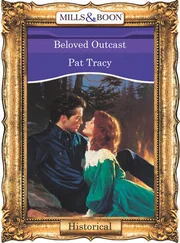Denver served them both. Washing, cooking, forcing, cajoling her mother to eat a little now and then, providing sweet things for Beloved as often as she could to calm her down. It was hard to know what she would do from minute to minute. When the heat got hot, she might walk around the house naked or wrapped in a sheet, her belly protruding like a winning watermelon.
Denver thought she understood the connection between her mother and Beloved: Sethe was trying to make up for the handsaw; Beloved was making her pay for it. But there would never be an end to that, and seeing her mother diminished shamed and infuriated her. Yet she knew Sethe's greatest fear was the same one Denver had in the beginning-that Beloved might leave. That before Sethe could make her understand what it meant-what it took to drag the teeth of that saw under the little chin; to feel the baby blood pump like oil in her hands; to hold her face so her head would stay on; to squeeze her so she could absorb, still, the death spasms that shot through that adored body, plump and sweet with life-Beloved might leave. Leave before Sethe could make her realize that worse than that-far worse- was what Baby Suggs died of, what Ella knew, what Stamp saw and what made Paul D tremble. That anybody white could take your whole self for anything that came to mind. Not just work, kill, or maim you, but dirty you. Dirty you so bad you couldn't like yourself anymore. Dirty you so bad you forgot who you were and couldn't think it up. And though she and others lived through and got over it, she could never let it happen to her own. The best thing she was, was her children. Whites might dirty bet all right, but not her best thing, her beautiful, magical best thing-the part of her that was cl ean. No undreamable dreams about whether the headless, feetless torso hanging in the tree with a sign on it was her husband or Paul A; whether the bubbling-hot girls in the colored-school fire set by patriots included her daughter; whether a gang of whites invaded her daughter's private parts, soiled her daughter's thighs and threw her daughter out of the wagon. She might have to work the slaughterhouse yard, but not her daughter.
And no one, nobody on this earth, would list her daughter's characteristics on the animal side of the paper. No. Oh no. Maybe Baby Suggs could worry about it, live with the likelihood of it; Sethe had refused-and refused still.
This and much more Denver heard her say from her corner chair, trying to persuade Beloved, the one and only person she felt she had to convince, that what she had done was right because it came from true love.
Beloved, her fat new feet propped on the seat of a chair in front of the one she sat in, her unlined hands resting on her stomach, looked at her. Uncomprehending everything except that Sethe was the woman who took her face away, leaving her crouching in a dark, dark place, forgetting to smile.
Her father's daughter after all, Denver decided to do the necessary.
Decided to stop relying on kindness to leave something on the stump. She would hire herself out somewhere, and although she was afraid to leave Sethe and Beloved alone all day not knowing what calamity either one of them would create, she came to realize that her presence in that house had no influence on what either woman did. She kept them alive and they ignored her. Growled when they chose; sulked, explained, demanded, strutted, cowered, cried and provoked each other to the edge of violence, then over. She had begun to notice that even when Beloved was quiet, dreamy, minding her own business, Sethe got her going again. Whispering, muttering some justification, some bit of clarifying information to Beloved to explain what it had been like, and why, and how come. It was as though Sethe didn't really want forgiveness given; she wanted it refused. And Beloved helped her out.
Somebody had to be saved, but unless Denver got work, there would be no one to save, no one to come home to, and no Denver either. It was a new thought, having a self to look out for and preserve.
And it might not have occurred to her if she hadn't met Nelson Lord leaving his grandmother's house as Denver entered it to pay a thank you for half a pie. All he did was smile and say, "Take care of yourself, Denver," but she heard it as though it were what language was made for. The last time he spoke to her his words blocked up her ears.
Now they opened her mind. Weeding the garden, pulling vegetables, cooking, washing, she plotted what to do and how. The Bodwins were most likely to help since they had done it twice. Once for Baby Suggs and once for her mother. Why not the third generation as well?
She got lost so many times in the streets of Cincinnati it was noon before she arrived, though she started out at sunrise. The house sat back from the sidewalk with large windows looking out on a noisy, busy street. The Negro woman who answered the front door said, "Yes?"
"May I come in?"
"What you want?"
"I want to see Mr. and Mrs. Bodwin."
"Miss Bodwin. They brother and sister."
"Oh."
"What you want em for?"
"I'm looking for work. I was thinking they might know of some."
"You Baby Suggs' kin, ain't you?"
"Yes, ma'am."
"Come on in. You letting in flies." She led Denver toward the kitchen, saying, "First thing you have to know is what door to knock on." But Denver only half heard her because she was stepping on something soft and blue. All around her was thick, soft and blue.
Glass cases crammed full of glistening things. Books on tables and shelves. Pearl-white lamps with shiny metal bottoms. And a smell like the cologne she poured in the emerald house, only better.
"Sit down," the woman said. "You know my name?"
"No, ma'am."
"Janey. Janey Wagon."
"How do you do?"
"Fairly. I heard your mother took sick, that so?"
"Yes, ma'am."
"Who's looking after her?"
"I am. But I have to find work."
Janey laughed. "You know what? I've been here since I was fourteen, and I remember like yesterday when Baby Suggs, holy, came here and sat right there where you are. Whiteman brought her. That's how she got that house you all live in. Other things, too."
"Yes, ma'am."
"What's the trouble with Sethe?" Janey leaned against an indoor sink and folded her arms.
It was a little thing to pay, but it seemed big to Denver. Nobody was going to help her unless she told it-told all of it. It was clear Janey wouldn't and wouldn't let her see the Bodwins otherwise. So Denver told this stranger what she hadn't told Lady Jones, in return for which Janey admitted the Bodwins needed help, although they didn't know it. She was alone there, and now that her employers were getting older, she couldn't take care of them like she used to.
More and more she was required to sleep the night there. Maybe she could talk them into letting Denver do the night shift, come right after supper, say, maybe get the breakfast. That way Denver could care for Sethe in the day and earn a little something at night, how's that?
Denver had explained the girl in her house who plagued her mother as a cousin come to visit, who got sick too and bothered them both. Janey seemed more interested in Sethe's condition, and from what Denver told her it seemed the woman had lost her mind.
That wasn't the Sethe she remembered. This Sethe had lost her wits, finally, as Janey knew she would-trying to do it all alone with her nose in the air. Denver squirmed under the criticism of her mother, shifting in the chair and keeping her eyes on the inside sink. Janey Wagon went on about pride until she got to Baby Suggs, for whom she had nothing but sweet words. "I never went to those woodland services she had, but she was always nice to me. Always. Never be another like her."
"I miss her too," said Denver.
Читать дальше











